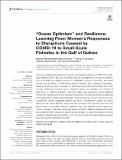Files in this item
"Ocean Optimism" and resilience : learning from women's responses to disruptions caused by COVID-19 to small-scale fisheries in the Gulf of Guinea
Item metadata
| dc.contributor.author | Okafor-Yarwood, Ife | |
| dc.contributor.author | van den Berg, Sayra | |
| dc.contributor.author | Collins, Yolanda Ariadne | |
| dc.contributor.author | Sefa-Nyarko, Clement | |
| dc.date.accessioned | 2022-06-22T10:30:08Z | |
| dc.date.available | 2022-06-22T10:30:08Z | |
| dc.date.issued | 2022-06-22 | |
| dc.identifier | 279434196 | |
| dc.identifier | b1207029-31ad-4d97-9ad9-c3c11e214c40 | |
| dc.identifier | 85133708533 | |
| dc.identifier | 000826987200001 | |
| dc.identifier.citation | Okafor-Yarwood , I , van den Berg , S , Collins , Y A & Sefa-Nyarko , C 2022 , ' "Ocean Optimism" and resilience : learning from women's responses to disruptions caused by COVID-19 to small-scale fisheries in the Gulf of Guinea ' , Frontiers in Marine Science , vol. 9 , 862780 . https://doi.org/10.3389/fmars.2022.862780 | en |
| dc.identifier.issn | 2296-7745 | |
| dc.identifier.other | ORCID: /0000-0003-4952-9979/work/114977201 | |
| dc.identifier.other | ORCID: /0000-0003-4138-9158/work/114977521 | |
| dc.identifier.uri | https://hdl.handle.net/10023/25557 | |
| dc.description | The University of St Andrews Restarting Research Funding Scheme (SARRF) is funded through the SFC grant reference SFC/AN/08/020. The University of St Andrews Institutional Open Access Fund (IOAF) is acknowledged for open access support. | en |
| dc.description.abstract | This study examines the response of women to disruptions caused by COVID-19 in small-scale fisheries (SSF) in the Gulf of Guinea (GOG). It interrogates the concept of resilience and its potential for mitigating women’s vulnerability in times of adversity. We define resilience as the ability to thrive amidst shocks, stresses, and unforeseen disruptions. Drawing on a focus group discussion, in-depth interviews with key informants from Cote d’Ivoire, Ghana and Nigeria, and a literature review, we highlight how COVID-19 disruptions on seafood demand, distribution, labour and production acutely affected women and heightened their pre-existing vulnerabilities. Women responded by deploying both negative and positive coping strategies. We argue that the concept of resilience often romanticises women navigating adversity as having ‘supernatural’ abilities to endure disruptions and takes attention away from the sources of their adversity and from the governments' concomitant failures to address them. Our analysis shows reasons for “ocean optimism” while also cautioning against simplistic resilience assessments when discussing the hidden dangers of select coping strategies, including the adoption of digital solutions and livelihood diversification, which are often constructed along highly gendered lines with unevenly distributed benefits. | |
| dc.format.extent | 16 | |
| dc.format.extent | 1661563 | |
| dc.language.iso | eng | |
| dc.relation.ispartof | Frontiers in Marine Science | en |
| dc.subject | "Ocean Optimism" | en |
| dc.subject | Resilience | en |
| dc.subject | COVID-19 | en |
| dc.subject | Livelihood diversification | en |
| dc.subject | Gender | en |
| dc.subject | Women | en |
| dc.subject | Small-scale fisheries | en |
| dc.subject | Gulf of guinea | en |
| dc.subject | SH Aquaculture. Fisheries. Angling | en |
| dc.subject | E-DAS | en |
| dc.subject | SDG 14 - Life Below Water | en |
| dc.subject.lcc | SH | en |
| dc.title | "Ocean Optimism" and resilience : learning from women's responses to disruptions caused by COVID-19 to small-scale fisheries in the Gulf of Guinea | en |
| dc.type | Journal article | en |
| dc.contributor.sponsor | Scottish Funding Council | en |
| dc.contributor.institution | University of St Andrews.Geographies of Sustainability, Society, Inequalities and Possibilities | en |
| dc.contributor.institution | University of St Andrews.School of Geography & Sustainable Development | en |
| dc.contributor.institution | University of St Andrews.Centre for Global Law and Governance | en |
| dc.contributor.institution | University of St Andrews.School of International Relations | en |
| dc.identifier.doi | 10.3389/fmars.2022.862780 | |
| dc.description.status | Peer reviewed | en |
| dc.identifier.grantnumber | N/A | en |
This item appears in the following Collection(s)
Items in the St Andrews Research Repository are protected by copyright, with all rights reserved, unless otherwise indicated.

